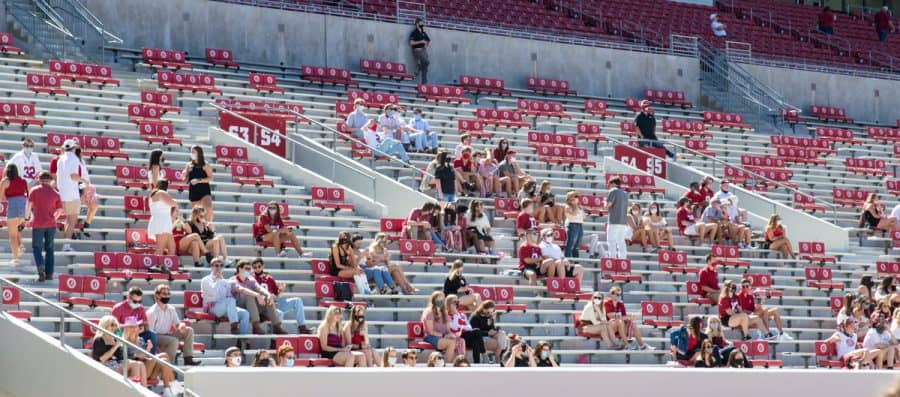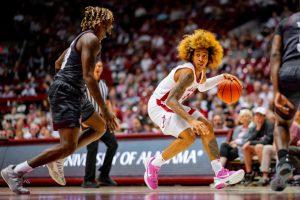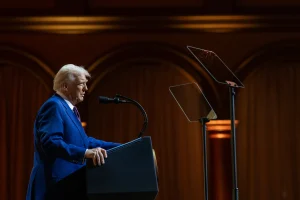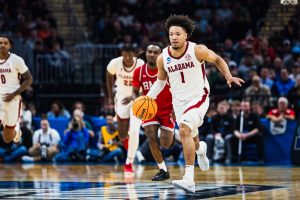‘Very Shallow Rationale’: GSA president upset with grad student ticket allotment
Graduate Student Association president Quin Kelly was fine with cutbacks during football season. But he wants more tickets for grad students this semester.
March 1, 2021
COVID-19 accommodations have affected all parts of the student body this year. It’s safe to say that every student on campus has had to adjust, whether it’s not being able to go to class or missing out on a certain sporting event due to the lack of tickets. Officials in the Graduate Student Association (GSA), however, say that their group received the brunt of the COVID-19 cutbacks when it came to student tickets.
According to the president of the Graduate Student Association (GSA), Quin Kelly, the amount of student tickets allotted to graduate students for sporting events was reduced from 10% to 5%. Kelly voiced the frustration of his constituents and said that he felt like the Student Government Association (SGA) slighted the GSA.
“[It was a] very shallow rationale in our opinion,” Kelly said. “We don’t feel that it was well explained or really specified but they were saying that graduate students… our opt-in wasn’t at a high rate or as high as the senior ticket rate.”
Kelly said the SGA justified the reduction by using two football games from the fall 2020 regular season. The numbers that the group presented to Kelly showed that graduate student tickets were transferred at a higher rate. Will Bradley, SGA communications director, responded to the comments made by Kelly and said that SGA worked with the UA athletic department to determine the new numbers.
“UA Athletics adjusted the allotment percentages in consultation with SGA based on the data we had seen from ticket usage and ticket reselling in the fall semester, and to allow more seniors to attend sporting events during their final semester on campus,” Bradley said.
However, Kelly said that was not enough to justify what happened to the graduate student ticket allotment.
“Grad students are not just students, you know?” Kelly said. “I have grad students who are parents or grandparents, and they have to balance, ‘Well if I go to this game maybe I catch COVID’ or, ‘If I travel to a different state you know if I go to the championship game, which was only open to seniors, then I can catch COVID.’”
Although Kelly and other graduate students were upset about changes made during football season, he felt that the fall semester had more pressing needs to attend to besides the shortage of graduate student tickets. However, Kelly said that when the same decision was made for men’s basketball and baseball, he had to voice his opposition.
“I wasn’t surprised by the football [allotment change] and we decided not to, you know, have an open public fight about athletics right now when there’s so many other causes to be champion on campus when it relates to inclusion,” Kelly said.
Inclusion was the strongest argument that Kelly made against the decision to give seniors 70% of the student tickets for baseball games and 45% of basketball tickets.
“Inclusion has to be inclusion across the board,” Kelly said. “Race is a huge part of it, but you know, we can’t pick and choose when to be inclusive, and that’s really the bottom line. I’m a big brother, I’m the oldest of seven, so I really see leadership through those eyes and my mother would never have it to where… we all didn’t have the opportunity to opt into something. At the end of the day this is just exclusion.”
The GSA and SGA are two separate governing bodies, and SGA has complete student control over what happens to student tickets. Kelly said that SGA officers approached him at the beginning of the 2020 semester to ask him about changing the graduate student tickets from 10% to 5%. Bradley said that the GSA had the opportunity to speak out against the ticket change.
“SGA met with the GSA president several times throughout the ticket allotment discussions and sought his input during meetings,” Bradley said. “They were given every opportunity to voice their opinion.”
Kelly confirmed that he was given the opportunity to disagree, but said he feels like his appeal was ignored.
“I think what was really disheartening was they asked my opinion,” Kelly said. “They approached me, asking me whether we would just give up our 5%, and when I at large showed my opposition, they just ignored me and said we’re going to do this anyway… I really think it’s an unfair process that SGA was able to work with the office of the athletic department… [and] get tickets related to the senior class. It’s super unfair.”
The return of the amount graduate student tickets to 10% is the bare minimum that Kelly is asking for.
“I think grad students make up 14–15% of the student body so really it would be fair for us to have 14 or 15% of the ticket sales,” Kelly asked. “At this point we’ve missed every sports season because of this.”
Bradley said the SGA understands the struggle of the GSA and other groups that feel underrepresented, but that there are no perfect solutions during a pandemic.
“We believe that the ticket allotment process as it currently stands is the most equitable possible process, while keeping in mind COVID-19 precautions and capacity guidelines during the pandemic,” Bradley said. “We realize that the circumstances of COVID-19 are challenging, and look forward to fully attended sporting events, hopefully in the near future.”
Kelly said he feels like he and the GSA were totally disregarded by the SGA. However, he said that it is not too late to fix this issue. Baseball season is still going on and readjusting the student ticket allotment is an important cause to him.
“I really just felt like it was an abuse of power and it was under the table and wasn’t explained to the public,” Kelly said. “As a student government association president in previous years and in my undergrad years, I just think it’s super unethical, and as the leader of graduate students on campus, I think it was super unethical.”





















